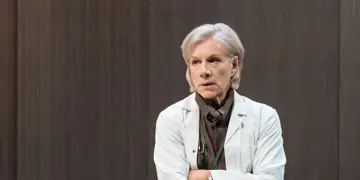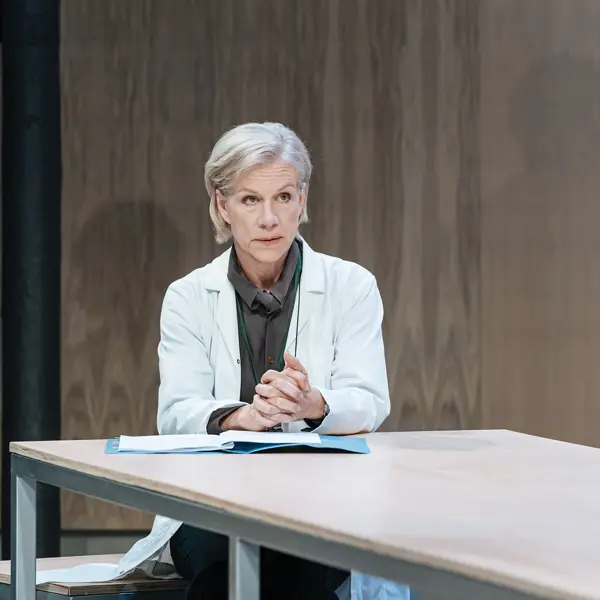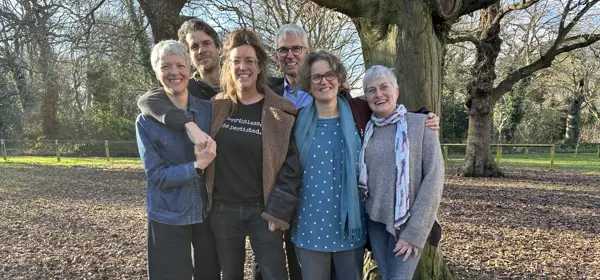Dragged into a culture war
Dragged into a culture war
In a West End play, Juliet Stevenson portrays a doctor who tries to act in her patient’s best interests but gets caught in a destructive media storm. The actor tells Seren Boyd why she identifies closely with her character
If only doctors were left to get on with medicine, immune to politics and culture wars. If only being a doctor was enough… A divided society does not, however, allow that for Ruth Wolff, played by Juliet Stevenson in Robert Icke’s unsettling play The Doctor, now running in London’s West End.
Dr Wolff focuses entirely on her patient, a 14-year-old dying of sepsis after a self-administered abortion, insisting that the girl should not know she’s dying.
So, the doctor bars a priest from reading the last rites. ‘If the girl had to die and I couldn’t save her, I wanted her to die calmly without knowing she was dying,’ says Ms Stevenson, speaking for and as Dr Wolff. ‘That’s all I could do for her in the end. She’s my patient.’
Dr Wolff holds fast to one identity: ‘I am a doctor.’ But in a society fractured by identity politics, she is cast in other roles: Jewish, white, woman. In closing the door to the priest, she unleashes a media storm that will ultimately destroy her career.
Echo chambers
Ms Stevenson recognises Dr Wolff is flawed: she’s stubborn, authoritarian, uncompromising and, as the play hints, not entirely objective in her decision-making. ‘She’s not the moral heroine,’ says Ms Stevenson.
But Dr Wolff pays over the odds for her intransigence. Her very public undoing through TV debates and Twitter, a ‘woke’ culture’s witch hunt, is as disturbing as it is plausible.
Ms Stevenson first played The Doctor in London in 2019, winning the Critics’ Circle Award for Best Actress that year – then COVID blocked the play’s transition to the West End. The intervening years have only strengthened the polarising forces at work in society, making the play ‘not only burningly relevant but necessary’.
‘People are just yelling into their echo chambers: you select the truths that you want to hear and hate everyone who doesn’t agree with you,’ she says. ‘You can’t voice any opinion contrary to the mainstream.
‘Laying the play like a template over the last two-and-a-half years makes you realise how much has changed in largely terrifying ways, how these forces which are shaping our society are out of control. Dr Wolff is not speaking to reason.’
She has found it painful to watch the way public perceptions and media portrayals of doctors have become distorted in the pandemic. ‘Two years ago, they were the nation’s heroes and heroines, because we were battling COVID, and now they’re on the receiving end of hate campaigns because of things like having to move surgeries online.
It’s so wrong that doctors should take the rap for government mistakes and inadequacies and the chronic lack of NHS funding.’
NHS campaigner
Being able to explore potent themes ‘in the dark with a group of strangers’, within the safe confines of the stage, is what makes theatre so powerful, Ms Stevenson says.
However, she is aware real doctors don’t have the luxury of leaving these ‘best interests’ debates and ethical conundrums at the theatre door. All too often, reality mirrors fiction, in distressing cases such as the withdrawal of 12-year-old Archie Battersbee’s life support.
Ms Stevenson’s husband Hugh Brody is from a family of doctors. They have close friends in the medical profession and their daughter, Rosalind, is a medical student in London.
Ms Stevenson has discussed this role with them at length. ‘So often doctors are on the receiving end of misdirected rage or grief,’ she says. ‘Doctors haven’t created the problem: they’re just trying to cope with
the problem.’
She has long been an ardent supporter of the NHS and last year threw her weight behind Your NHS Needs You!, a campaign against further privatisation. ‘Free medical care for everybody at the point of delivery is the greatest single thing about this country,’ she says.
‘So, what makes me angrier than anything else about this series of Conservative governments is that they’ve secretly privatised the NHS while claiming to support it. They have no mandate for doing this.’
Career conundrum
Despite her accomplished acting career and strong involvement in human rights and charity work, Ms Stevenson describes ‘a long period’ in her 40s when she considered other avenues, fearing she wasn’t ‘contributing enough’.
To her surprise, it was always to medicine that her thoughts drifted. ‘My overarching need in life is to feel useful.
This play is useful: we need to tell these stories. I ardently believe the arts are important. But if you were in medicine, you’d never lie awake at night thinking: Is there any value in my job?’
The Doctor runs at the Duke of York’s Theatre, London, until 11 December. Reduced-price tickets in the stalls are available for NHS workers when selecting seats
Photo credit: Manuel Harlan




